Exponent II's Blog, page 118
March 8, 2022
Guest Post: Digging For Truth #ReconstructingFaith

Guest post by Mer Monson.
Mer is a writer, poet and Master Transformative Coach who plays in the space of effortless change with clients all over the world through coaching, speaking, teaching and podcasting. You can learn more about her and her work at www.mermonson.com.
A 49-year dance with this church has offered both rich and rocky soil for my soul’s first love: Digging for raw unfiltered truth. I have stayed faithful, feeling the pull to behave and belong, but I am a mystic at heart and have always longed to just take off my good-girl clothes and get into bed with God. It’s kinda beautiful how each rock, each crisis of faith, has helped me undress in some way and fall more deeply into God’s arms and into my own.
A strained relationship with my mom and desires beyond motherhood brought on an early crisis in my teens and twenties. Sitting in the gritty discomfort of believing marriage and motherhood were my only righteous options did a number on me. Watching three older sisters come out the other side of temple marriages filled with abuse, infidelity, alcoholism and drug addiction didn’t help. I’m still not sure how I managed, years later, to marry a gem of a guy and enjoy three gorgeous sons.

I also warred in those early years with feeling less than as a female—in God’s eyes, in the church’s eyes, and in my own. I must have prayed a thousand times, “God, show me your real face. Show me who I really am.” This female wrestle culminated in a pre-mission temple fiasco, which propelled me into Biblical Hebrew and every word I could get my hands on about Adam and Eve. Truth made its way to the surface, and my Dad and the Mormon God gradually disentangled themselves from the real deal. I used to feel eternally burned at the stake. Now I just wonder when the church will get it right.
Despite deep study and full activity, it wasn’t until my 30s that I learned to stop stabbing myself with what I thought was “the gospel.” I could never seem to get past the glitch that getting Jesus’ help hinged on my being worthy and good enough to get it. This loop kept me from grace, never able to put down the weight of insecurity, self flagellation and depression. During those years, a deeper knowing propelled me beyond the church to find help and healing, which I found in a hundred gorgeous souls and spaces. I stumbled upon a few ways to integrate this fresh healing with the gospel, but largely hung out in a jaded and guarded stance toward the church even as I served and stayed engaged.
And then, at 44, a grace bomb hit. A walk through cancer pushed me to the edge, and through a string of graces I fell out of my story, out of my sick body, out of my troubled mind and into a fully present God, one that is always right here, right now, in everything, in everyone, in me. No strings attached. I’m still up to my neck in human mess of course, but being alive feels very different now—less heady and more spacious, alive, steady and light.
The church and the gospel look completely different through this new lens. I see we’ve turned something profoundly simple into something ridiculously complex. I see we are intertwined with and a part of God in a way no one and nothing has the power to undo. I see there’s nothing to earn and nowhere to get to, only an ever-present God-soaked reality to wake up to. God doesn’t look like a guy out there in a beard and white robe anymore; it looks like there is nowhere and in no-one God is not. It looks like I’ve been trying to save a made-up self when my true self is already like Jesus, already made of love and wisdom and peace. It looks like sin is mere blindness and my mess ups are forever innocent, a side effect of not realizing who and what I am.
I know now that the raw unfiltered truth I’ve been mining for is bigger than any concept or belief, purer than any reaching for it here in the world of people, ideas and organizations. This knowing has allowed me to hold my religion with much looser, more metaphorical arms. I see so many things that need to change in the church, but I also see the church cannot hurt the reality of God or the truth of who I am. This gives me grace to move toward change from a wider, deeper, steadier landing, and gives me the freedom to be faithful to love and my own knowing above all else.
I still swim in the mystery of whether I belong. I do the hokey pokey, here on the edge of the inside. I crave something different and step beyond its walls to stir up fresh divinity, then circle back to the same pew, again and again, reclining into the piece of my heart that wants the familiar shape and texture of Jesus, the one I can touch in my Sunday dress. I somehow find honest words to speak without turning heads, even when standing fully in the light of what I see without making waves feels like a tug of war between my muscles and my bones. But these people, they have my heart. I cannot stop looking for God in their faces, in this wild and steady faith, in the wide streams of light beneath our cramped ideas, in the swelling cavity of my own mormon heart. I want peace with this church that’s cradled me and suffocated me, fed me and starved me, given me the world and kept me from it. I want to unearth enough truth to find a way to be here, in a larger me with a larger God, and still belong.
This post is part of the series, Reconstructing Faith. Find more from this series here.
March 7, 2022
The Limits of Women’s “Influence”
This is not yet another post about the infamous racist, sexist screed that Brad Wilcox gave to youth of the Alpine Stake last month. But I am going to start with his words, and specifically, what he told the young women they “don’t have” and what they “do have.”
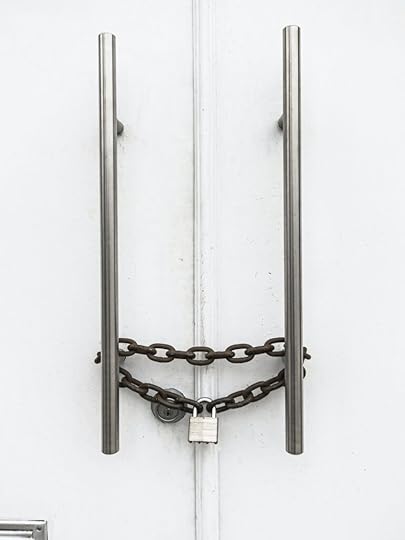 Photo by phil cruz on Unsplash
Photo by phil cruz on UnsplashWilcox told the youth that women and girls don’t have ecclesiastical keys and ordination. He suggested that because most men don’t have keys within a ward or stake at a given time, it shouldn’t be a big deal that the women never have them. He then suggested that we are asking the “wrong question” about why women aren’t ordained—that we should ask why women “don’t need to be” ordained. He couldn’t identify a reason, but this unnamed characteristic women presumably carried from the premortal world was supposed to satisfy the young women in the audience as sufficient reason to keep them out of decision-making positions of power and authority in the church.
What the women have, he said, is influence. He said, “So girls, don’t mix keys up with influence. We’re certainly not saying the only ones who have influence in the church are the Bishop, the Elder’s Quorum President, the Teacher’s Quorum President, and the Deacon’s Quorum President. Surely there are others at all levels of the Church who have great influence without having keys. So don’t mix those up; don’t think that that’s something that’s needed to be able to make a difference.”
As though women are “mixing those up” and limiting themselves and their influence when facing systemic inequality.
This argument that women have “influence” paired with the implication that they, therefore, don’t need institutional positions of authority is nothing new. I’ve heard it in the church my entire life. It has been in articles and podcasts given by women (here and here) and is oft spoken and written about by men (such as here and here).
Why is there so much talk about the influence of women in the church? Certainly, there is talk about the influence of fathers and male church leaders and the influence of the Spirit. But there is something different in the discussions of the influence of women, both in frequency and function.
The rhetorical function of the frequent talks and articles about the influence of women is not to honor or praise women, but to persuade women to be satisfied with influence divorced from power. This is not asked of men. Men are allowed both influence and power.
 Photo by Everyday basics on Unsplash
Photo by Everyday basics on UnsplashAs a noun, “influence” means, “the power or capacity of causing an effect in indirect or intangible ways.” As a verb, it is “to affect or alter by indirect or intangible means.”
“Power,” on the other hand, is the “ability to act or produce an effect” and “possession of control, authority, or influence over others.” “Power” involves both the ability and position to act. This is direct and tangible. In my favorite definition, the Reverend Martin Luther King, Jr. defined power as the ability to achieve purpose and effect change.
Power is direct and tangible. People in positions of power have both influence and the ability to act to achieve purpose and effect change. Influence alone is indirect and intangible. When categories of people are cut out of positions of power based on immutable characteristics such as race, sex, or gender identity (specifically for women and gender and racial minorities), we are saying that these entire categories of people are cut out of the avenues by which they can achieve purpose and effect change in direct and tangible ways.
When men have access to power while women are limited to influence, maleness is treated as active, while femininity is treated as passive. This feeds unhealthy gender dynamics where women feel they cannot say what they want, think, or believe lest they be accused of overstepping. They develop passive-aggressive tendencies to hint, suggest, and consider, and are left slamming their purse on the counter when they get home after being dismissed and ignored once again by the men with the power to make the decisions.
While certainly within their callings, women can and do act and make decisions and exert influence, there is no calling held by women in the church that is not overseen by male authorities. There is no decision or budget item that cannot be overturned by men. There is not even a pretense of partnership. And when men do abuse their own power over women in the church, there is no recourse for women. There is no system in the church whereby women or gender minorities can hold men accountable.
 Photo by Markus Spiske on Unsplash
Photo by Markus Spiske on UnsplashWomen are treated to article after article about their great influence in order to persuade them to develop this influence without seeking positions of power to accompany this influence. Women are explicitly taught the bounds of their influence and the cost they will pay for going beyond that or out of line. Let’s look at two examples.
In his September 2009 First Presidency Message, President Dieter F. Uchtdorf shared, “The Influence of Righteous Women.” He tells the women, “I hope that my dear sisters throughout the world—grandmothers, mothers, aunts, and friends—never underestimate the power of their influence for good, especially in the lives of our precious children and youth!” However, he also cautions women, “May I invite you to rise to the great potential within you. But don’t reach beyond your capacity. Don’t set goals beyond your capacity to achieve.”
What is beyond the capacity of women? What is it that women cannot achieve? He doesn’t get specific, but he seems certain that there are hard limits on what women can or should do.
In his October 2013 general conference address, Elder D. Todd Christofferson spoke on “The Moral Force of Women.” He said, “From age immemorial, societies have relied on the moral force of women. While certainly not the only positive influence at work in society, the moral foundation provided by women has proved uniquely beneficial to the common good.” As he went on, it became clear that the primary moral force and influence of women is in policing and enforcing chastity and in recognizing that “there is not a higher good than motherhood and fatherhood in marriage.” He also cautions women not to blur the masculine with the feminine—that women must protect their moral influence through clean language, modest dress, and chaste behavior, lest they degrade themselves and lose their influence in the world.
If women do not adequately perform womanhood as he and other church leaders define it, they will lose their influence and proximity to power. These cautions do not apply to men the same way. Surely men are taught of their great influence and are cautioned to remain morally clean, but their influence does not need to come at the exclusion of power. Both are seen as good for men.
Women run into hard limits of their influence when they are cut out of positions of power. Even if a woman is an active, temple-recommend-holding, tithe-paying, calling-serving, married mother, she has no recourse when a stake president dismisses her opposition to the calling of a morally questionable man into the bishopric. The stake president can shake her hand, thank her for her concern, and walk down the hall to set apart the man in question. And when eleven months later, the stake president is faced with seven victims of this man’s sexual harassment and professional misconduct, he can quietly release the man with a vote of thanks. And if the woman then attempts recourse through the area authority seventy, she can again be thanked for coming forward while being assured that an early release from a calling is embarrassing enough in place of discipline and that she shouldn’t worry because the church has the “gold standard” for handling sexual misconduct. Influence means little when it clashes against someone with both power and influence. And no, this is not a hypothetical situation.
 Photo by Patrick Tomasso on Unsplash
Photo by Patrick Tomasso on UnsplashWhen women are limited to influence while men are allowed both influence and power, women are dehumanized. Women can be dismissed as easily as the weather in a church that holds most activities indoors. Certainly, wise church leaders check the weather forecast before planning an activity outdoors and may adjust accordingly. But except for in extreme weather conditions, indoor meetings and activities can go on regardless of the weather outside. Consult the weather or don’t—and carry on as planned.
Boys and men in the church don’t need to be convinced of their great influence. They get to live it. If women (and gender minorities who are completely left out of the talks and articles) are to be treated as fully-human adults, they need more than influence. They need the ability to achieve purpose and effect change.
For a healthier church structure, we need to fully reconsider the system that places men exclusively in positions of power over others. It is not enough to call women into the current power structure that still holds power over others rather than a system that shares power with and extends power to others. For a healthier church and world, we need systems of power that do not exclude anyone based on immutable characteristics and allow an equal place for all at the table with both a voice and a vote.
March 6, 2022
My Best Family Home Evening
I was going to start this by writing, “we aren’t super traditional Family Home Evening people…” but then I realised—who is? Hey, we do it most weeks, so I call it a win, even if we do it our own way on a Sunday (because swim team is on Monday),
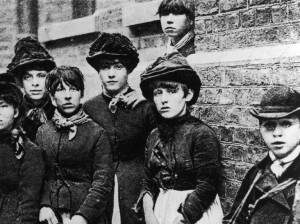
So this week, among the prayer, dessert, lesson and song assignments, we also have a “something fun,” assignment. Often this is a game, or we go for a walk, or whatever. This week, we took a bit of a dive into history and the presenter taught us about the Matchstick Women (also called the “matchgirls”).
In summary, in London in the late 1880’s, these women worked 14 hour shifts in the production of match making, which at the time, saw them exposed to the deadly chemical vapours of phosphorus. The phosphorus was the chemical in which lit the match when struck. But it also rotted the jaws of the women who breathed the chemical in, causing disfiguration, and even death. Many of the women working in these conditions were impoverished immigrants or teen orphans who desperately needed employment, no matter how dangerous the conditions or poorly paid they were.
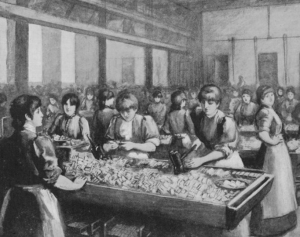
Though the male factory workers were disinterested in the conditions of the women, other women noticed. A women’s rights activist and writer named Annie Besant exposed the poor conditions in an article titled White Slavery in London.
The article caused a massive stir, inspiring the male factory owners to attempt to force the women to sign a document refuting Ms. Besant’s claims by declaring that they were happy with their disfiguring and deathly working conditions.
The women refused.
The male factory owner attempted to “set an example” by firing one of the women who refused to sign. And then another. And then another. And then…
Within days, 1,400 women and girls were on strike for better working conditions.
The improved working conditions were gradually met; first with re-employing women who had been fired for refusing to sign the document. Then for better machinery (much less slicing off of fingers) and eventually shorter hours and better wages. It would take two decades before the use of phosphorous in match making was declared illegal in England. This event was the first strike to inspire a national movement towards unions. Especially important for today, this was the birth of Occupational Health and Safety practices and legislation which still is a positive impact on working conditions today. Do you like that you get a lunch break at work? Thank these women. Do you like being protected from chemical exposure at work? Thank these women. Do you like safe work environments in general? Thank these women. They started the revolution. Yes, the revolution is still going today for fair wages, child care, and so many other things. But these women started the work that we are engaged in. These nameless, uneducated, often orphaned, some immigrant, impoverished women inspired a workplace revolution. You can, too.
The best part? My husband. He was the presenter. He chose to share this bit of history to me and my daughters, partly because of his own work in safety in the workplace, but mostly because he wanted us to feel empowered for International Women’s Day. The next best part? He was wearing his t-shirt with Laurel Thatcher Ulrich’s quote, “Well-behaved women seldom make history.”
Best. Family. Home. Evening. EVER.
What are you doing for International Women’s Day? We are going to a feminist book launch at our local historical society. We will all be wearing our “Well-behaved women seldom make history” t-shirts.
March 3, 2022
Guest Post: God of the Box-Checkers #ReconstructingFaith
Guest post by Bridget J.
Bridget, who has previously rarely arrived at church on time, now gets there 10 minutes early so she can broadcast sacrament meeting over Zoom.
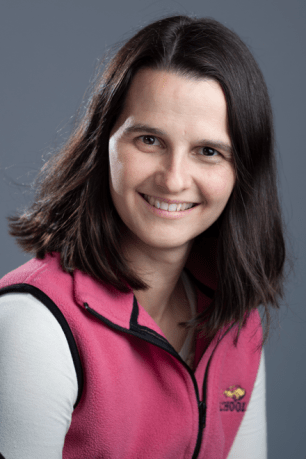 Bridget J
Bridget JI didn’t embark on my faith journey on purpose. It never even occurred to me that I needed to go anywhere. I thought I’d already built my spiritual foundation.
As a child, I had absolute trust in my parents and the church. I believed in what some people might name the God of the Missing Car Keys. I prayed with faith to find whatever needed finding. In school, I prayed before I studied so that the Lord could bless me with remembrance during tests. And it worked. God answered my prayers.
I considered the blessed and happy state of those who kept the commandments of God. With sure footing, I grew in love and understanding. I trusted God to take care of any issues I had. All I needed to do was be patient. I was happy. And content. Life was good.
I attributed my happiness to obedience. If there was something I could do to choose the right, I did it. Unwittingly, my faith evolved into worshiping the God of the Box-Checkers. This may be a new term to you but I think you’ll find the concept familiar. King Mosiah taught about it when he said that if you serve others, you’ll be happy.
Ooh, I helped weed a widow’s garden. Check. I also gave an elderly sister a ride home from the church activity. Check. If I don’t lie, steal, murder or commit adultery, I’ll be happy. Got those down, check!
Our contemporary church boxes include behaviors like attending church every Sunday, saying daily prayers, paying tithing and fasting every month. Check, check, check, check! Serve a mission. Check! Marry a returned missionary, get married in the temple, have a quiver full of children. Check, check and double check. Go to the temple, give to the poor, serve in the church, hold family scripture reading every night, and family prayers. So many boxes and so many checks!
I was basically crushing it. All those boxes. I earned an “A” grade in gospel faithfulness and had a front row seat in the Celestial Kingdom.
Only, I wasn’t crushing it. I wasn’t happy. Everything that was supposed to give me happiness left me feeling drained and exhausted. There were times when the disconnect was so great that instead of allowing myself to feel my emotions, I was wondering what I should be feeling. And then I would try to feel that.
Happiness is transactional, right? If I do Great Thing A then I’ll feel Positive Emotion X. Except when I checked off Box A, instead of feeling X, I felt resentful. Instead of exploring my feelings or being curious about what they meant, I swept them up and refused to deal with them.
The first time my husband and I went to marriage counseling, we had two young children. I didn’t know if our marriage would survive. It was rocky for months. We chose to move forward with faith. We chose family. And put on our happy faces and kept moving forward. In the next two years, we added two more children to our family.
One spring, I read an article in the local paper about a few exchange students that needed host families to live with. I felt impressed that we should to host the Slavic student. I initially thought my strong prompting had something to do with my desire to bring the culture of my mission into our home. While this premise was enough to get me to open our home, it wouldn’t be until later that I would discover the real reason.
At the end of August, Jovana came to live with us for the school year. At the time, I was working full time as a mother of four children aged 4, 3, 2 and 1. Plus, I was 8 months pregnant. And working part time my family’s business. Jovana immediately jumped into our family life and routines. She played with the children every day after school and always made sure to do her household chore in addition to her school work. Each evening after reading a few bedtime stories, she hung out for a bit with me and my husband.
 Jovana with Evan and brother.
Jovana with Evan and brother.About 3 weeks after Jovana came to live with us, our youngest son passed away. Our world stopped. And spun faster. Then tilted on it’s axis. I did not sign up for this wild ride.
Evan died on a Tuesday. We buried him on Saturday. And Monday afternoon, after the last of our visiting family flew home, I gave birth. This new rainbow baby gave me a ray of sunshine and sliver of hope in my darkest hour.
I hold a lot of anger surrounding this period of my life. I checked off all the boxes and my son died. Where was God when my husband gave Evan a healing blessing? Where was God when over 20 people in the ER were working to revive him? Why couldn’t my faith or mother’s love save him?
Jovana held our home together in the ensuing weeks when I couldn’t bring myself to get out of bed. Her presence and love played a major role into my initial healing and deep grief. We bonded in adversity. I believe she came into our lives when she did as a blessing from God. An answer to future prayers I had yet to ask.
Through grief, my capacity to hold love has increased. Without the intense pain, I wouldn’t have felt the love. My favorite scripture at that time was one where Nephi stated that he doesn’t know the meaning of all things but he knows that God loves his children.
I didn’t understand why Evan died. Nevertheless, I knew God loved me.
A few years later we traveled to the Balkans for Jovana’s sister’s wedding. Her family welcomed us into their home to be a part of their celebrations as if we were one of them.
 Jovana on her wedding day in an Orthodox ceremony.
Jovana on her wedding day in an Orthodox ceremony. There was so much love, it left me feeling unsettled. Erroneously, I’ve believed all my life that the strongest families on the planet are found within my own religion. And yet there I was, feeling love and experiencing a connection stronger than any other family I’d ever known.
I don’t want to pretend that Jovana’s family all have rosy lives without challenges. They’re real just like the rest of us. It’s just that the spirit of love and inclusion they showed not only me, as an outsider, but also for their family members touched my soul. There was no judgement over anyone’s choices. They loved each person’s faults as much as their positive traits. They trust each family member to live their best life, even if they make choices that they wouldn’t make themselves. They aren’t checking off boxes for family loyalty. They just love. And I want to be just like them.
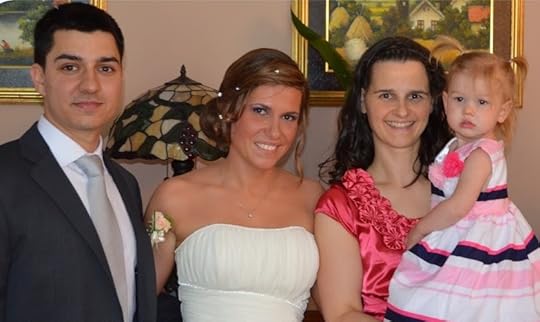 Jovana’s sister and her groom during a traditional “buying the bride” negotiation before the wedding.
Jovana’s sister and her groom during a traditional “buying the bride” negotiation before the wedding. A few years ago, my husband left the church. The first Sunday I brought my children to church without him was hard. I wanted to cry. I felt the loss of what I thought we once were to my core. I felt like crying in the chapel every Sunday for months especially when someone would ask me where he was. Over the next several months, half of our children also stopped going.
My husband leaving our shared religion exposed cracks in our marriage that we’d been ignoring for years. It’s hard to address those issues with love and without judgement. We went to marriage counseling again to see if we could break the unhelpful communication cycles we get into.
This is where I’m not sure how well I’m handling my mixed faith family situation. I can say that the pain is gone and I can attend church without tears. As a former box checker, my faith is maturing somewhat. I no longer find peace in my previous black and white thinking. I find rigidity to be overly divisive and contentious. I need to let go and trust that each member of my family is making the best decisions that they can for themselves. We don’t all have to make the same choices to feel love or belonging in our family.
My faith has become more nuanced as I learn to listen to my heart and analyze my beliefs. I’ve dropped the boxes. Even the cultural boxes like thinking that I should wear a dress to church on Sundays. It took a lot of effort to drop that one. My New Year’s Resolution in 2019 was to wear pants to church every week. I calculated that I’ve worn a dress to church approximately 2000 times in my life. Wearing pants for 50 Sundays shouldn’t be that big of a deal. But it was. It was so uncomfortable for me in the beginning. Forget how others may have judged me. I was judging me.
I successfully accomplished my pants goal. Though, it turns out that 2019 was a slippery slope since 2020 brought about Covid and Zoom. Then a lot of us wore pajamas to church. Now that we’re back in person, I allow myself to choose each week whether I want to wear pants or a skirt without pressure from a cultural tradition.
I used to believe in a literal Restoration of the gospel. Now I’m not so sure. At this point in my faith journey, I’m content with not knowing. I don’t think the question really matters. It has nothing to do with how I show up for my family, ward or community. I believe there’s a place for me at church as a doubter and questioner. While my faith has lost its certainty, it’s presently enough for me to associate with the Saints because they’re my people.
These days, I have more questions than answers. What if we’re wrong about faith? There are billions of people on this planet who believe differently than we do. Isn’t it enough to be happy in the strong community that we’ve built on love and inclusion? Do we have to be right, too? What if the Restoration wasn’t about religion? What if it’s about restoring our relationship to the Divine and uncovering the divine within each of us?
What if the childhood faith we once held and lost is what needs restoring? What if the rigorous box checking we learned in our youth eats away at our humanity? Could our judgements of others destroy our ability to trust and love? Is our own self-righteousness getting in the way of our happiness? Do we care more about boxes than the virtues they represent? What if everything we’re looking for can be found in the God of Love?
This post is part of the series, Reconstructing Faith. Find more from this series here.
March 1, 2022
Guest Post: The Tale of Three Journals
Guest Post by Louise Hammel. Louise Hammel is a septuagenarian who lives by the sea. She keeps a journal of questions that no one can answer in this life. Still, she wants to know.
 When I returned to church activity in the 1990s, I made it a goal to “feast on the words of Christ” (2 Nephi 32:3). One aspect of that was to feast on the words spoken in General Conference since “whether by mine own voice or by the voice of my servants, it is the same.” (D&C 1:38) I bought a journal and sat, ready, in front of my TV to record all I received each broadcast session.
When I returned to church activity in the 1990s, I made it a goal to “feast on the words of Christ” (2 Nephi 32:3). One aspect of that was to feast on the words spoken in General Conference since “whether by mine own voice or by the voice of my servants, it is the same.” (D&C 1:38) I bought a journal and sat, ready, in front of my TV to record all I received each broadcast session.
This journal read like transcriptions of conference proceedings. If every copy of the Ensign conference issue on earth disappeared, I would have a record! It also served as a testament of the new faithful me. I used little discernment in my entries. I acted like I was taking a religion class and needed comprehensive notes to prepare for the final exam. If Elder So-and-So said there were 5 steps of whatever principle (aren’t they fond of numbered lists?) I made sure I got them all, as though I would need to know this to get back to Heaven or if quizzed by a Stake President passing by.
My second journal covered a greater span of conference years. I stopped chronicling everything. I continued to watch all sessions in real time, because I wanted to be there if or when a big announcement or revelation was given. I didn’t want to be left behind now that I had found my way back. I still looked forward to conference weekends as a time to focus on the words given by the apostles and prophets. Through the years I captured a fair number of good quotes and a few numbered lists that fostered my spiritual growth and served well for future talks and lessons.
By the time I purchased a third conference journal, my enthusiasm for General Conference had waned. I did look forward to conference Sundays since I could do church at home (a harbinger for my delight having home church the past two years). Fewer talks satisfied my soul. It felt that too many speakers spoke from their heads, not their hearts. Too many discourses were fear-based or a checklist approach to living the gospel. It dawned on me that I had been holding out for direct quotes from the Lord. That was understandable based on the rhetoric I’d heard over the pulpit. I now understood direct statements were not going to come. I realized that the remarks, although inspired, reflected the speaker’s perspective and experiences. And these were almost exclusively male perspectives and experiences. I grew to understand my perspective and experiences were of equal worth for my journey.
Then I was introduced to the tenet “expectations are planned disappointments”. The April 2020 Restoration Bicentennial Conference was my nadir. Oh, how I needed balm for my soul during that horrible spring of pandemic and political upheaval. I found none. I did find myself creating mindless doodles and writing in shout-y caps. I finally began to question the wisdom of investing 8-10 hours in engaged listening for one or two possible insights. I started recording the sessions so I could fast-forward through talks that sedated me. Part of me felt guilty. I had voted to sustain these speakers. Part of me still feared I might miss something critical. Yet the healthy part of me gave permission to focus on what was personally inspiring and let the rest go. What didn’t speak to me might speak to someone else on their stretch of their path.
I don’t know what the next development will be. I may be on my last conference journal, though there are many, many blank pages to fill. I still desire to feast on the words of Christ, spoken or written. I’ve learned to stop looking for quotation marks bracketing them. And I have learned to seek them wherever I can find them.
“My Big Fat Mormon Ukraine Wedding” by Mariya Manzhos
Originally published in the Summer 2015 issue Global Zion feature of Exponent II Magazine, the Exponent is pleased to reprint this article by Ukrainian Latter-day Saint Mariya Manzhos, My Big Fat Mormon Ukraine Wedding, now available for complimentary reading on our website.
“My Big Fat Mormon Ukraine Wedding” by Mariya Manzhos
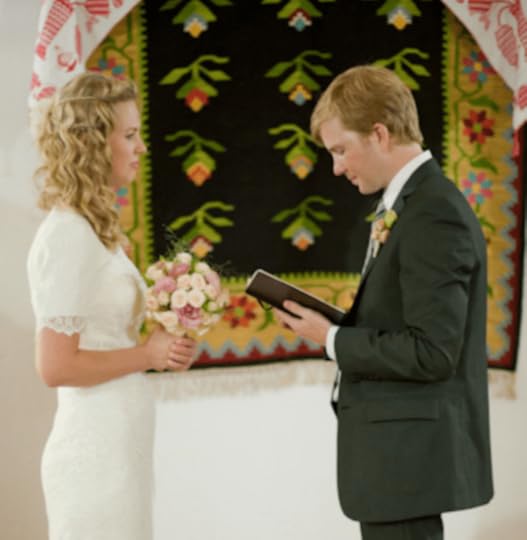 https://exponentii.org/2022/02/28/my-big-fat-mormon-ukraine-wedding-by-mariya-manzhos/
https://exponentii.org/2022/02/28/my-big-fat-mormon-ukraine-wedding-by-mariya-manzhos/
February 28, 2022
Women’s session to return at #LDS General Conference — ‘Hooray,’ says feminist poet #LDSconf #GeneralConference #WomensSession
(Exponent blogger April Young-Bennett was less enthused.)
Read the full article:
Women’s session to return at LDS General Conference — ‘Hooray,’ says feminist poet

Staffing Seminary
I am a member of the Relief Society Presidency and a few weeks ago we got an assignment from the Bishopric to “think of someone who could sit in on Seminary lessons” in order to have two deep leadership. I live in what some members might call “the mission field” so seminary is taught by a member of the ward for free at 6:30am. We also have to have another adult to just sit in the back of the room and be there. At the beginning of the year our seminary teacher was a man, and one of the seminary dads was able to sit in the back and work remotely on his laptop. Then we changed seminary teachers and now the teacher is a woman so we have to have a woman to sit in the back. As we know, any time a man and a woman are together without adult chaperonage adultery ensues, even in a room full of teenagers at 6:30 am when one of the adults is working remotely.
The Relief Society Presidency got this assignment because no one in the Bishopric could think of/persuade anyone to do it, but we might be able to find that special someone. I summed up the necessary qualifications.
Ideally would be the mother of a seminary student for reasons of fairness, reasonable expectation, and probably dropping off anyway.Must not have a job that is incompatible with sitting at the Church at that timeMust not have any children younger than high school who have to get ready for schoolMust not have any other early morning obligations or goals of her ownMust not have any health problems that make the job unduly burdensomeMust be willing to commit to sitting in that room every weekday morning from 6:15-7:30 even if she is retired and wants to enjoy some well-earned rest.Must not have any evening commitments in order to go to bed early to be ready to teach a class at 6:30 am every day.The request for volunteers had been in the bulletin for weeks. The Bishopric have racked their brains. And unsurprisingly the Relief Society Presidency was unable to produce a unicorn. Honestly it is a miracle we have someone who is willing to teach. Being Seminary teacher amounts to taking on an unpaid part time job in a field entirely out of your own sphere of expertise. The teachers that I have known told me their routine is to teach, get the kids to school, then spend the morning studying for the next day’s lesson. When done with diligence (assuming it is your first time and you’re creating new lesson plans) the job can take three+ hours a day five days a week.
This is an unreasonable expectation that is not equitable across the Church. In high-density membership areas the Church owns seminary buildings, has enough of a presence to have release-time seminary, and above all has trained, paid teachers. Now I’ll be the first to say my experience with CES has been problematic. I’ve heard a lot of speculative nonsense and charisma masquerading as the Holy Ghost. But if it is a paid job in Utah, why is it a volunteer position in other places? It is an extraordinarily burdensome calling that burns through members and virtually no one accepts with any degree of enthusiasm.
We should pay seminary teachers. It goes far beyond the bounds of a reasonable volunteer expectation for the vast majority of people. It comes with a significant opportunity cost. Paying ward seminary teachers would offset this and likely make it easier to find people who would be willing to do the job. We could also pay the “two deep” chaperone – or pay two teachers who trade off who is the “sit in the back so no one commits a crime” adult. Honestly I’ve accepted with grim resignation that this fate will come to my door when my children are in high school. I’m an experienced teacher, and often the consensus is that if your kid is in seminary you kind of have to be willing. Much as I hate early mornings, and I had a very negative experience with seminary the first two years (after which I stopped going and did makeups at home), I like to think I could make it less sexist and cliché. I’d find the prospect less loathsome if it came with a paycheck though.
February 27, 2022
Jana Riess: In Mormonism, yesterday’s heresy is today’s orthodoxy
 Author Carol Lynn Pearson
Author Carol Lynn PearsonIn 1973, Mormon author Carol Lynn Pearson’s feature article for the ‘Ensign’ magazine was pulled at the last minute, and she was banned from writing about women for Church publications. What was controversial then has become the party line.
Read the full article by Jana Riess at RNS here.
Sacred Music Sunday: Dona Nobis Pacem
Photo by Artem Podrez on Pexels.com
" data-medium-file="https://i0.wp.com/www.the-exponent.co..." data-large-file="https://i0.wp.com/www.the-exponent.co..." width="1880" height="1058" src="https://i0.wp.com/www.the-exponent.co..." alt="paper cutouts on a gray surface" class="wp-image-51876" srcset="https://i0.wp.com/www.the-exponent.co... 1880w, https://i0.wp.com/www.the-exponent.co... 300w, https://i0.wp.com/www.the-exponent.co... 1024w, https://i0.wp.com/www.the-exponent.co... 768w, https://i0.wp.com/www.the-exponent.co... 1536w" sizes="(max-width: 1000px) 100vw, 1000px" data-recalc-dims="1" />Photo by Artem Podrez on Pexels.comI had planned to write a Lenten music post because Ash Wednesday is coming up this week. However, with the recent Russian attack on Ukraine, I felt the need to choose a different piece of sacred music for the week.
I first became acquainted with Dona Nobis Pacem when I was in college. Shortly after 9/11, the university choir was asked to perform it, so we learned it in a single rehearsal. It’s a simple and lovely tune with a text drawn from the Agnus Dei section of the mass. It translates to “grant us peace”.



